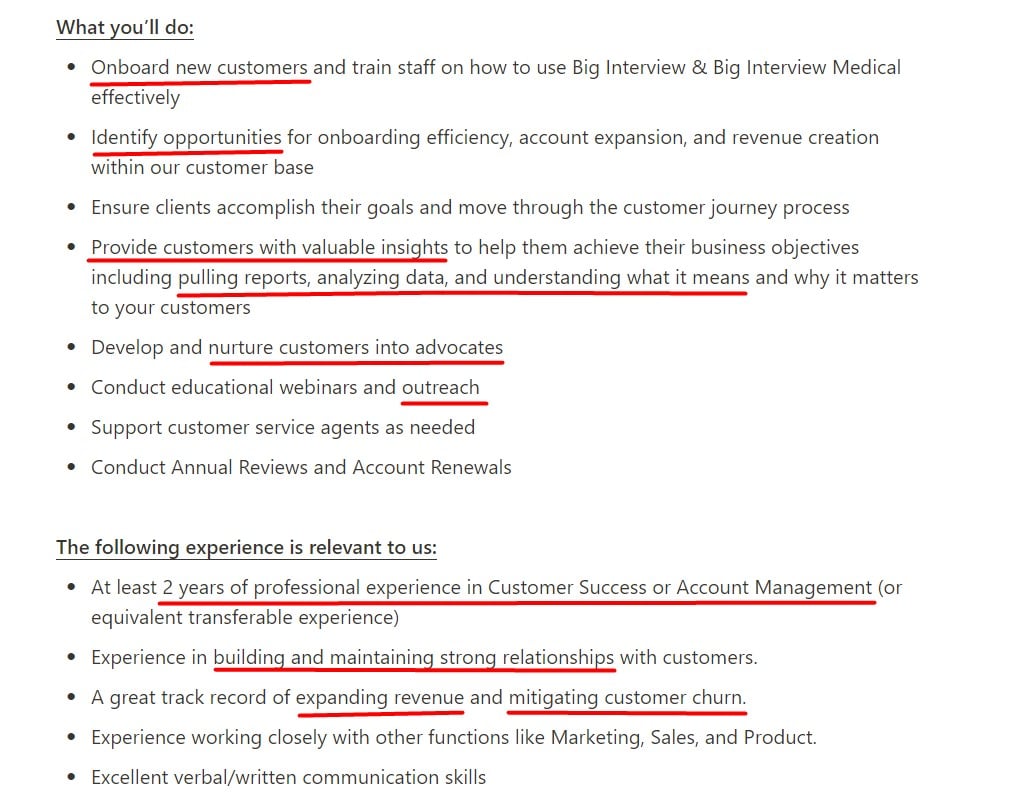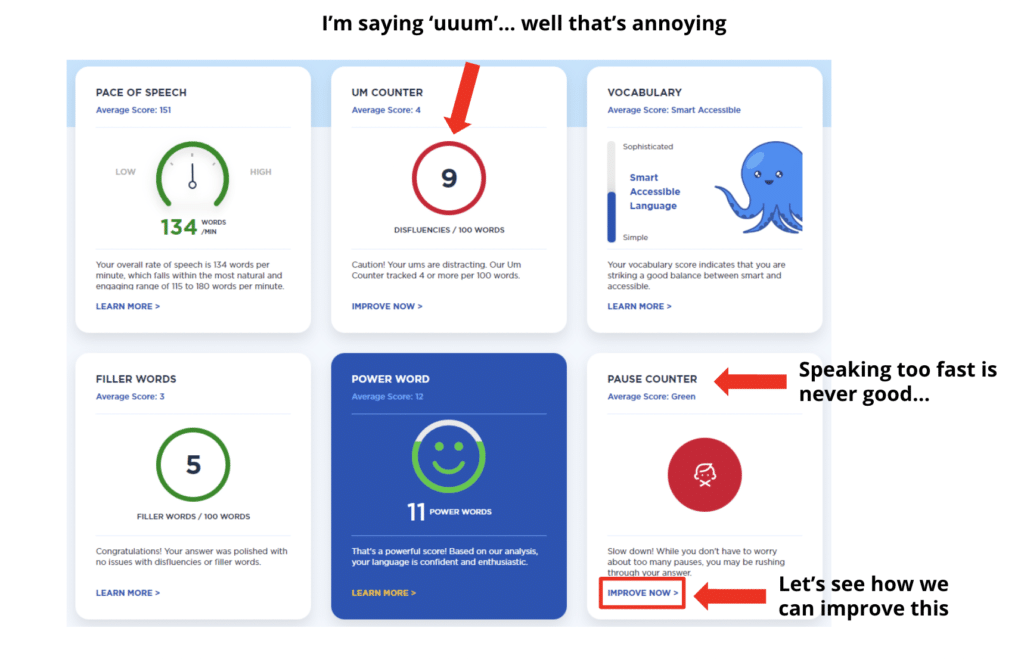Behavioral interviews focus on your past experiences and ask you to provide an example of how you used your skills or acted in a specific work situation.
To nail a behavioral interview, you need to come prepared with good examples and base them on the core competences from the job description. Use the STAR method to give concise, impactful, and structured answers.
In this article, we will talk about:
- What a behavioral interview is
- What to expect in a behavioral interview
- How to prepare for it
- The secret tip that will help you impress interviewers
- How to use the STAR format to answer behavioral interview questions
- Common mistakes to avoid
Don’t waste days compiling overused interview techniques. Get original answers to every single question you could expect.
What Is a Behavioral Interview?
A behavioral interview is a type of job interview that focuses on your past experiences and how you behaved in different situations.
It’s based on the assumption that your past behavior is a reliable predictor of how you’ll behave in the future — hence the word behavioral.
In that sense, a behavioral interview is slightly different from traditional interviews because it focuses on your specific experience and skills, making it easier for you to display relevant competencies and prove you’re the right fit.
A pretty nice break from vague, hypothetical questions like “What would you do if…” or “Imagine that…”, right?
Why do interviewers use behavioral interviews?
Because behavioral interviews help them create a structured, constructive process with a standardized set of questions and evaluation criteria. This decreases the risk of unconscious bias and promotes equal opportunities for all candidates.
That’s actually beneficial for you, too — you won’t be at a disadvantage, and you’ll get the exact same questions as any other candidate.
How to Prepare for a Behavioral Interview
Research the company
No matter the type of interview or the questions you get asked, company research lies at the heart of any interview preparation.
Running background checks and having useful information in place will help you figure out if you want to work for that company and formulate proper answers to prove you’re the right candidate for a position.
When researching the company, check out:
- Their website
- Career page
- News page
- News about the company
- Company social media
- Glassdoor reviews
- Forums (Reddit, Quora)
Based on the information you gather, you’ll understand the company’s current situation and if you see yourself in their team.
It’ll also be easier to think of engaging, smart questions that will prove you did your homework and you’re genuinely interested in contributing to the success of the company.
Match your experiences with the job description
Remember that secret tip that helped me delight interviewers and make it to the final round of the last 4 interviews I attended?
Drum roll… I matched my answers with the skills in the job description. The truth is, if you go through the job description and extract the key skills needed for the job, then prepare for questions about those skills, you’ll have that interview in the bag.
Here’s how you do it: study the job description carefully.
Search for keywords (words that convey the most important information such as what duties the position entails, what kind of experience the ideal candidate will have, and key skills) to find out exactly what they’re looking for.
Then, think about your own work experience and find parallels between what they’re looking for and what you can offer them.
Doing this will help you figure out exactly what experiences, achievements, and skills to highlight in your answers to prove you’ve got what it takes to be successful in that role.
For example, check out the Customer Success Manager job ad below where we underlined keywords:

If you were applying for this position, you’d want to emphasize:
- Your experience with onboarding clients, expanding accounts, and finding revenue opportunities within the customer base.
- Some of your key achievements regarding expanding revenue, mitigating customer churn, and turning customers into advocates.
- A story where you displayed your customer-centric mindset and built strong relationships.
And if you don’t have the exact experience and skills they need, mention transferable skills that could help you achieve results.
Use the STAR method
You want to use compelling stories as your answers to behavioral interview questions. These stories will best illustrate your skills and accomplishments, and they’ll help you create coherent, structured, relevant responses.
Here’s how to do it and what to focus on:
- Situation = The initial problem or the situation you found yourself in
- Task = The task that was ahead of you in order to solve the problem
- Action = Specific steps you took to address the problem
- Results = Results that followed (quantitative or qualitative)
For more details, check out this video:
To sum up, using the STAR method helps you:
✔️ Prepare compelling stories in advance
✔️ Display your strengths in an engaging way
✔️ Be confident in your delivery
But mentally preparing will not be enough.
In order to get ready, have an informative answer, and deliver it confidently, you’ll need to practice your answers verbally. You can:
- Get creative and practice with a friend
- Practice in front of the mirror
- Record yourself
- Or use the Mock Interview Tool that will give you actionable feedback on how to improve.
You’ll get valuable insights that will make your delivery perfect: feedback on your pace of speech, power words used, ummm-counter, eye contact, and similar.

Hone your communication skills
Interviewers will focus on how well you anchor your answers in specific, real-life situations from your professional past. If you’re able to tell engaging stories that revolve around things that you dealt with or accomplished, you’ll do well in an interview.
But they will also assess the ways you display communication skills in real-time. This includes monitoring how you gather, filter, and convey information, your non-verbal communication, and your body language.
✅ Pro tip: If the interview is in person, practice a firm handshake and eye contact. Smile politely throughout the interview — not too much, but enough to come across as friendly and engaged in a conversation.
Pay attention to your body language, sit straight facing the interviewer, and don’t cross your arms. Don’t give in to nervous habits: no pen clicking, leg shaking, and similar.
For more tips, read about 9 Ways to Sell Yourself in an Interview (+ Examples).
The Structure of Behavioral Interviews
The process
The process itself is no different than any other interview. At the beginning of the interview, expect a few general questions about yourself, like:
✅ Pro tip: If you feel like selling yourself, this is your chance to prove how charming you are: strike up a conversation before the real deal starts. You can chit-chat about what you’ve been up to (perhaps you just read a cool industry-related article, or listened to a podcast), or choose another light topic to break the ice and set a nice tone for the rest of the interview.
The central part of the behavioral interview is reserved for behavioral questions which follow a specific pattern and ask you for specific things you dealt with: a time you solved a problem, made a difficult decision, achieved a goal, and similar.
If you’re interviewing for a managerial position, you’ll also get questions about how you organize the work of your team, how you manage conflict within a team, how you track performance, how you keep your team motivated, and similar.
Towards the end of the interview, you’ll want to ask a few smart, relevant questions that will demonstrate that you researched the company and the industry and you have specific ideas about how to contribute. For a detailed guide, head over to the article: 40+ Smart Questions to Ask at the End of Any Job Interview.
Common behavioral questions
Common behavioral questions you might hear in a behavioral interview are:
- Behavioral questions about leadership
- Customer service behavioral interview questions
- Problem-solving behavioral questions
- Behavioral questions about conflict resolution
- Questions about teamwork
- Behavioral interview questions about intercultural fluency
- Tell me about a time you failed
- What are you most proud of?
- Behavioral interview questions about work ethic
As you can see, interviewers will want to test key groups of skills like problem-solving, teamwork, conflict resolution, and work ethic.
Bear in mind, however, that each position is different — therefore, interviewers might phrase these questions in different ways, but the intention behind them will always be the same.
For a comprehensive guide on behavioral questions and how to answer them, visit this article: Behavioral Interview Questions and Sample Answers.
If you want to learn more about how to answer common interview questions, how to sell yourself, and how to negotiate your salary and benefits, sign up for our free course.
Mixed interview
Recruiters will rarely ask only behavioral questions in an interview.
Based on the type of role, your experience, or other factors, they’ll use different questions such as resume questions, self-analysis questions, situational questions (where they describe a situation and you tell them what you would do in it), brain teaser questions, spontaneous questions that will pop up during the conversation, and similar.
For example, you may only get a couple of behavioral questions in your first interview with a recruiter. But in your next interview, they could primarily focus on behavioral and situational questions.
But that’s nothing to worry about. Whenever you hear a question that starts with:
- “Tell me about a time when…”
- “Can you remember a situation when”
- “Have you ever experienced a situation when…”
Recognize that it’s a behavioral question and use the tips and tricks described in this article to answer them (don’t forget to use the STAR framework).
Not entirely happy with how many interviews you’re scoring? Maybe your resume could use some improvements. We’ve created some easy guides with actionable tips for how to make sure your resume is up to par, check these out:
- How to Write a Resume for a Job in 2023
- Resume Format: Which One to Choose
- Resume Summary Examples
- Resume Objective Examples
- Resume Profile: What It Is & How to Write It
- How to Describe Your Work Experience on a Resume
- How to Create an Education Section on a Resume
- The Best Skills to Put on a Resume in 2023
- How to Describe Hobbies and Interests on a Resume
Common Mistakes to Avoid Before and During Behavioral Interviews
Failing to self-reflect
Not reflecting on your experiences before the interview will make you look unprepared, unengaged, and, honestly, incompetent.
If you’re not sure of your top skills, strengths, and growth opportunities, you surely won’t be able to communicate them to someone else.
This is why you need to do some self-reflection before the interview which will help you think of your strengths and qualities and how to present them.
Think about:
- Some of your proudest achievements
- Your strengths
- Your weaknesses
- Situations where you were proud of yourself
- Lessons learned from each company you worked for
- Areas you’d like to improve in
- Your dreams and goals for the future
You don’t have to bring up your strengths only — revealing less flattering information about yourself, like your weaknesses or areas of improvement, can actually increase your chances of landing an offer, as you’ll demonstrate critical thinking and the desire to develop.
Lack of preparation
We’ve all been there. You have an idea of what you want to talk about in an interview, but you end up blurting out ideas one after another without coherently talking about them and backing them up with evidence.
This is 100% avoidable with practice.
Write down your ideas, create your answers and practice as much as you want, until you’re confident and know exactly what, when, and how you want to convey certain pieces of information.
We’re not saying you should learn your answers by heart and recite them like a robot, but knowing the order of your arguments and having practiced beforehand will make you much more confident and convincing.
Being vague
Not preparing in advance will result in your answers being vague and unconvincing.
If you’re not able to talk about your specific achievements and skills and provide details, you won’t sound credible.
You can prevent the risk of being vague in your answers by:
- Reflecting on your experience and skills
- Preparing answers in advance
- Researching the company
- Studying the job description (this will help you be more specific about what makes you the perfect candidate)
Here’s an example of a detailed answer:
Summary of the Main Points
- Behavioral interviews focus on your past experiences and how you behaved in certain situations.
- Such interviews are based on the assumption that your past behavior is a reliable indicator of how you’ll perform in the future.
- Behavioral interviewing is centered around key skills like communication, teamwork, and problem-solving.
- Behavioral interview questions are specific and usually begin with “Tell me about a time when…”
- These questions allow you to get specific and showcase your skills.
- To answer them, use the STAR (Situation-Task-Action-Result) framework.
- Always prepare in advance, practice your answers, and research the company to check if you’re the right fit.
__________________
Need a hand? There’s 3 ways we can help:
- Tired of interviewing and not landing the job? Discover actionable lessons and interview practice here (Rated with 4.9/5 by 1,000,000 users).
- Changing careers? Read about 18 Career Change Interview Questions and Sample Answers
- Read about 20+ Illegal Interview Questions and How to Handle Them
FAQs
Are behavioral interviews harder than “normal” job interviews?
If you don’t prepare in advance, they will be very hard. But if you take time to prepare, behavioral interviews will actually be easy. You’ll know exactly what to talk about and how to convey why you’re the right person for the job.
What are the advantages of behavioral interviewing?
You know what type of questions to expect, so it’s easier to anticipate and prepare answers. You also have more chances to prove you’re aligned with the job ad and company culture. It’s also a nice way to make the interview more engaging through your answers. On the interviewers’ side, they’ll be able to be more objective, decrease unconscious bias (they ask the same questions to each candidate), and assess if you’re the right fit for the role more precisely.
How to prepare for a behavioral interview if I have little or no experience?
Focus on transferable skills. For example, if you don’t have leadership experience, you can talk about how you took the lead on a tricky project, or how you spearheaded a college project as a student. Additionally, you can draw examples from your personal life where you displayed certain skills that would be relevant to the job (but don’t provide details that are too personal). And, of course, always use the STAR method.
What should I avoid saying in a behavioral interview?
Avoid being too vague or general in your answers. Avoid humble bragging (or pure bragging, really) — instead, talk realistically about your successes and provide evidence for your claims. Don’t exaggerate in your answers and don’t interrupt your interviewer.
How do I know that my behavioral interview went well?
The interviewer will seem engaged and they will ask a lot of follow-up questions — the longer the interview, the better the chances it went well. You might notice an interviewer’s face light up when you bring up a certain skill or accomplishment, or that they nod and take notes. They might have encouraging statements towards the end of the interview, and some will even tell you that you did well and made it to the next round right away.
How are behavioral interviews evaluated?
Many interviewers follow a standardized process where they create a scorecard (a list of key skills, traits, and qualifications needed for a position) for each candidate. Then, all candidates get the same behavioral questions based on the key competences required.
Interviewers note how your examples demonstrate your ability to excel in their role. They score each candidate in each category. This allows them to use real data instead of vague impressions to identify the strongest candidates. If you’re weak in a crucial category (can’t come up with a good teamwork example, for instance), that can knock you out of contention.
Not all interviewers are this organized and structured in their approach. However, even if they don’t use a consistent scorecard, you can bet that they are evaluating your stories based on how well they show what you could do for them.
